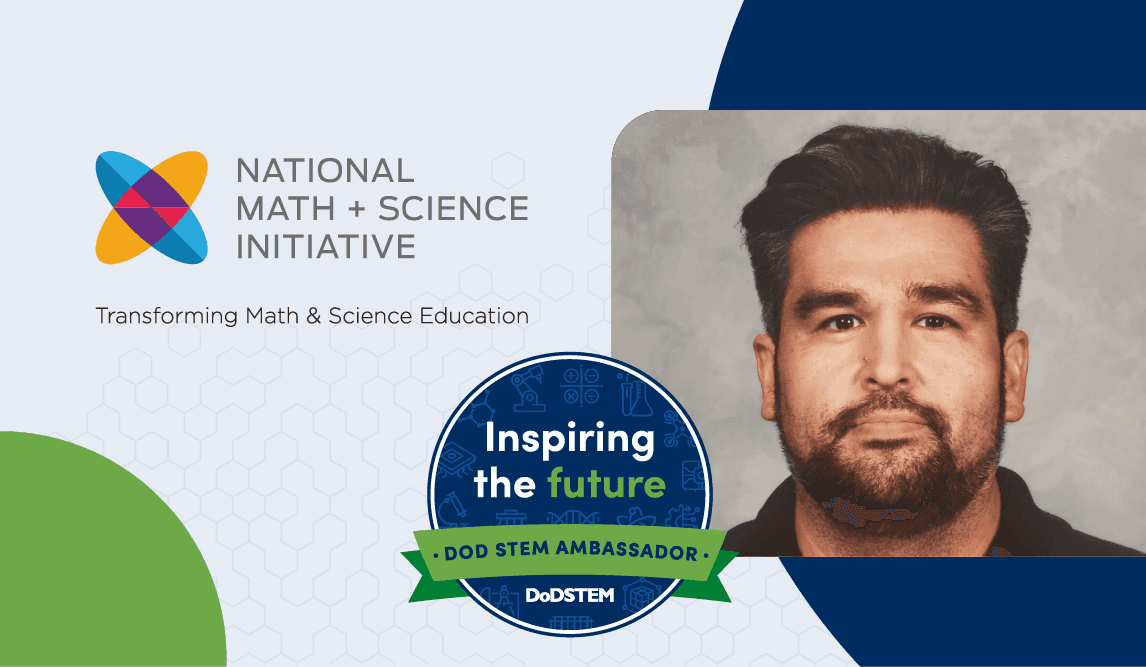No Need to Fear AI in Education
21 Oct 2024
DoD STEM Ambassador Encourages STEM Teachers to Embrace AI and Its Many Benefits
Artificial Intelligence (AI) is a revolutionary tool that is already part of our lives. Unfortunately, AI has a negative connotation among educators. This article will encourage teachers to push themselves to view AI with an open mind and learn about its many benefits.

The following was written by Eric Botello, a high school physics teacher and DoD STEM Ambassador. DoD STEM Ambassadors work with the Defense STEM Education Consortium (DSEC) to advance STEM outreach for students who are underrepresented in STEM or military connected. Botello was selected by National Math + Science Initiative as its DoD STEM Ambassador for the 2023-2024 school year.
It is understandable to fear Artificial Intelligence (AI). Fear of the unknown is real. Countless times in human history, people have come up with notions about the demise of creativity. I believe this fear is warranted. AI is a reality, and we must learn to use it wisely—especially in education. AI's potential is reminiscent of the early days of the internet, and as with the internet, it may take a special vision to foresee AI's societal benefits.
My first exposure to AI was when students began using programs like ChatGPT to write papers or do their assignments for them. While the ethical argument against AI is definitely a concern, cheating has always existed, so in this case we will again depend upon student integrity. Plagiarism has always been present, even when books were the only reference.
I should have had enough foresight to view ChatGPT as a tool to assist educators. Unfortunately, I did not even consider this possibility until I attended an enlightening conference session that covered how AI can help first-year teachers build lesson plans that are grade appropriate, differentiated, and in compliance with modifications for individual education programs (IEPs). The session leader was a college professor who taught his education students how to effectively and efficiently use AI technology.
Soon after, I slowly started entering the AI waters, so to speak. I used it to make a few multiple-choice and free-response questions. After a few iterations, I was very happy with what the program helped me create. I made a conscious effort to use AI more and learn how it could help me teach. At the National Science Teachers Association (NSTA) conference in spring 2024, I attended every talk about AI in the classroom to gain a better understanding of how teachers are using this technology. I learned about many different AI programs specifically designed to help teachers. I was amazed at how much is already available! For example, there are programs to create fully customizable lecture slides, as well as formative and summative assessments based solely on a topic. There are also programs to help write recommendation letters and emails to parents. I also learned when to be cautious when involving students in the process. This concern sent me down a rabbit hole to try to better understand how to use this technology in my classroom.
The U.S. Department of Education's Office of Educational Technology has developed a publication to help teachers understand the benefits and challenges of using AI in the classroom. I recommend reading "Artificial Intelligence and the Future of Teaching and Learning: Insights and Recommendations" as a starting point before using AI as an instructional tool. The article defines and explains AI, covers ethical concerns, and includes guidelines for best use. The article also outlines a multitude of uses and recommendations for teachers.
A discussion about AI's use in education would not be complete without asking ChatGPT what it thought were some of the best reasons to use AI in education. Following are some AI-generated topics:
- Personalized Learning: Discuss how AI algorithms can analyze students' learning patterns, preferences, and strengths to tailor educational content and activities to their individual needs.
- Automated Grading and Feedback: Highlight how AI technologies can automate grading processes for assessments such as multiple-choice tests, quizzes, and assignments.
- Data Analytics for Student Performance: Explain how educational institutions use AI-driven data analytics to track and analyze students' academic performance, attendance, and engagement.
- Smart Content Creation: Discuss the use of AI in content creation for educational materials, including generating interactive simulations, virtual labs, and multimedia resources.
In conclusion, I truly believe that AI in education is an inevitability. Educators must learn how to best utilize AI because students have already brought it to the classroom, and we must educate them on how to use this technology wisely.
About National Math + Science Initiative
The National Math + Science Initiative (NMSI) works to expand access to challenging coursework and improve student achievement through proven programs that consistently produce measurable and lasting results. NMSI partners with schools and districts nationwide to provide extraordinary training, support, and resources for teachers and students. NMSI’s College Readiness Program for Military Families provides military-connected students with well-trained teachers, challenging AP coursework and a strong foundation in STEM subjects that will prepare them for the rigors of college and career, whether military or civilian. For more information visit nms.org
About DoD STEM and Defense STEM Education Consortium
Defense STEM Education Consortium (DSEC) is a collaborative partnership of STEM-focused organizations dedicated to addressing and prioritizing our nation's STEM talent. DSEC aims to broaden STEM literacy and develop a diverse and agile workforce with the technical excellence to defend our nation. Through strategic investment in STEM education and outreach activities, the effort will provide students with more exposure to educational and career opportunities as well as DoD research. DSEC is led on behalf of DoD STEM by RTI International.